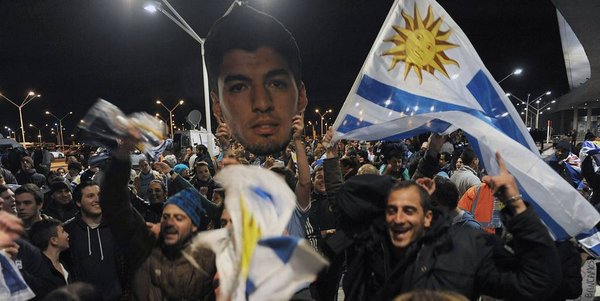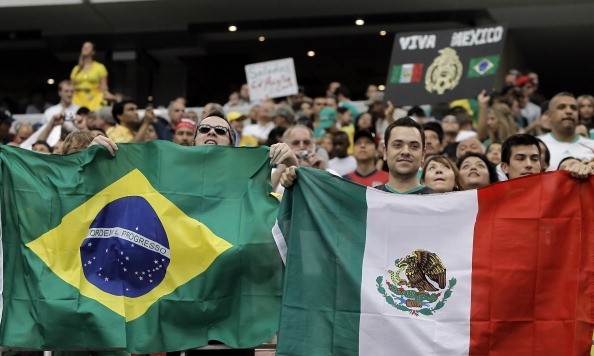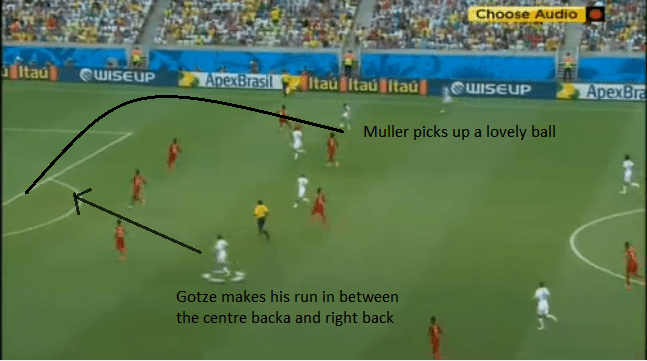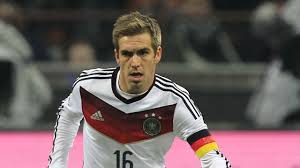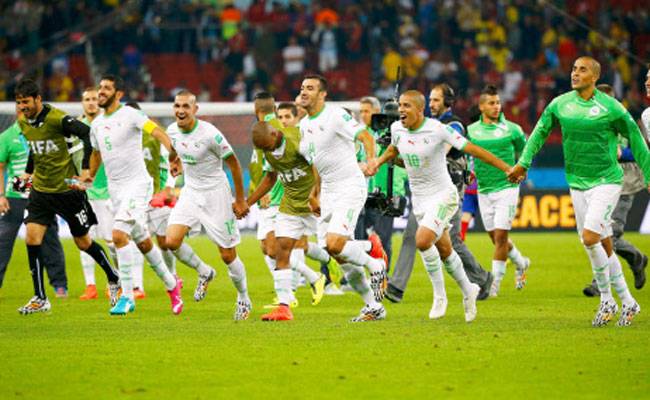As the knockout stages draw near in what has been a fascinating World Cup so far, sixteen teams look to give their all for the coveted title in South America. While there has been shock and awe with World Champions Spain crashing out, several South American teams have upstaged their European counterparts. Luis Suarez’s controversy remains the biggest talking point, while Asian teams have yet again flattered to deceive.
Time to break the European supremacy: There is no doubt that this World Cup has so far been for the American countries. There are only six European teams in the last sixteen while eight teams (50%) represent Americas and only two from Africa. Almost 83% of the South American teams who had earlier qualified have progressed beyond the group stages.
History shows that in the previous 19 editions only Spain have managed to become World Champions far away from home, in South Africa in 2010. Past precedents and talks of European teams being better travelers as suggested by Roy Hodgson has not yet come to pass. So far out of the eight clashes between the two continents, the Latin Americans boast a staggering 6-3 margin in their favour.
Trivia: All four World Cups held in South America—1930 (Uruguay), 1950 (Brazil), 1962 (Chile) and 1978 (Argentina) were won by teams from the home continent.
Only France and Switzerland have managed to beat Honduras and Ecuador respectively, arguably the weakest teams from the region. Yet France could only manage a scoreless draw against Ecuador. Elsewhere, Holland beat a spirited Chilean outfit in their last group encounter. Going by the bracket of the tournament, probability says 6 out of 8 teams from the Americas could be in the quarter finals.

While the heat factor does come into play, does it finally prove that pure athletes and dazzling skills finally outweigh the European dominance?
Luis Suarez embodies the Uruguayan’s will to win at any cost:
Last month I had read an absolute stunning piece on Luis Suarez’s by ESPN’s Wright Thompson who had mentioned that the Liverpool striker simply is the game’s most beautiful player when he is not biting opponents.
The 27 year old however remains a ‘hero’ back home, where morality takes a back seat when football is concerned, a bold statement to go over the line in order to win at any cost. No wonder thousands flocked to the airport to receive the controversial genius after being banned by FIFA for the stunning bite on Giorgio Chiellini.
Diego Maradona recently came out in support of Suarez wearing a shirt in his support and later said, “FIFA crucified the kid.” Understanding a volatile character like Suarez can only be best understood if we go back to his roots which is inevitably ‘street football’.
As Maradona claims in his autobiography El Diego, street football is a struggle, where winning is everything, where losing is simply not accepted. Nor do youngsters come to football academies in their parents’ Mercedes, they travel 50 kilometres by a rickety bus from the leaking roofs of their dilapidated homes to have a kick of the leather.
As Donal Og Cusac states in this piece, “Losing for Suarez means everything he fears and doesn’t understand beginning to threaten him again.” Having said that though, Suarez’s disgraceful act on the field can’t be defended, yet he is everything fans want to witness.
Managers and salaries, an uneven distribution:
Does paying your manager the most money help you at the World Cup?
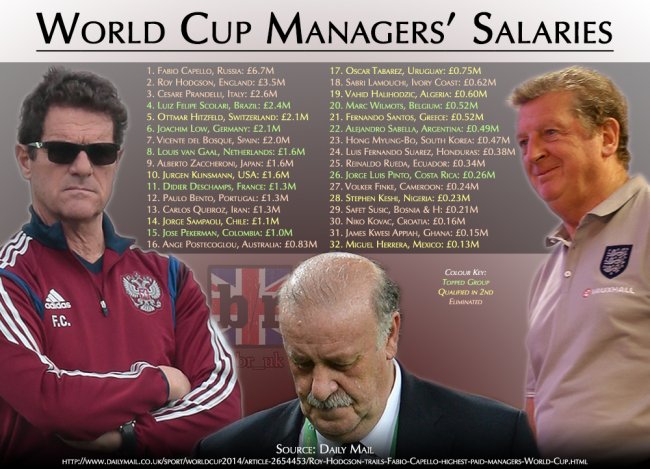
The top three best paid coaches have already returned back home while 11 of the 16 coaches who have managed to lead their teams to the knockout stages figure outside the top ten.
The disparity among the salaries is shocking to say the least, the eccentric Miguel Hererra is the least paid while the FA pays Roy Hodgson 26-times more than the Mexican coach. Fabio Capello seriously needs to justify himself after two shocking World Cups while Argentina’s Alejandro Sabella has only 11 coaches beneath him on the list.
Alberto Zaccheroni gets the same as Louis Van Gaal while Algeria’s Vahid Halilhodzic and Belgium’s Marc Wilmots only earn one third of the Italian who has been known to be the protagonist for the 3-4-3 setup.
Germany’s lack of a number nine can be exposed but Phillip Lahm is perhaps Football’s best student:
Thomas Muller and Mario Gotze have filled the number nine role to perfection for the Germans but the lack of a quality striker will surely give headaches to Joachim Loew in the further stages of the tournament, as Miroslav Klose simply doesn’t have the legs to last a full encounter.
Muller and Gotze’s off the ball combination however remains paramount to the German success as shown by the following snap which captures Gotze’s pin point finish against Ghana.
On the brighter side for the Germans, Phillip Lahm certainly remains one of the game’s best students. The diminutive Bayern Munich man can play in whatever role you ask him and as Pep Guardiola says, “He is the most intelligent player I have ever worked with.”
After being deployed as an anchorman on the right for his club by Guardiola, Lahm played the central midfielder role brilliantly against USA having Bastian Schweinsteiger and Toni Kroos alongside him.
A special mention on Algeria and Asian teams:
A lot was expected from Ivory Coast going into the tournament but it seemed that an ageing golden generation failed to prove themselves as perennial underdogs Greece did the African side in thanks to a last minute debatable spot kick.
Nigeria and Algeria qualified though but both the African outfits now face heavyweights France and Germany respectively with the odds heavily stacked against them.
However, qualifying for the knockout stages remains a victory for the African side who now seek revenge against Germany 32 years later. It was the 1982 World Cup in Spain when the entire football fraternity shed tears for the African side.
Algeria had beaten the Germans by 2-1 in what was the shock of the tournament, after the German players had claimed “they would dedicate the seventh goal to their wives and the eight goal to their dogs“. However what followed in the last Group match provoked universal scorn.
Here is an excerpt from the Guardian.
“The 3-2 victory for Algeria against Chile in their last group game would mean that they would become the first African team to reach the second round unless the group’s final game, to be played the following day, ended in a one- or two-goal win for West Germany over Austria, in which case both the European teams would progress at Algeria’s expense. In the 10th minute of that match Horst Hrubesch put the Germans in front. Then … nothing happened. Realising the scoreline suited both of them, Germany and Austria effectively stopped playing. In the ensuing 80 minutes there were no shots, and barely any tackles, crosses or sprints. The game was no longer a contest, it was a conspiracy. The teams’ cynicism provoked universal scorn.”
Coming to the Asian teams, none of them qualified, with Japan and South Korea specially disappointing and while Australia gave glimpses of their potential against Netherlands, it was always expected that the Socceroos would come short in a tough group.
Carlos Queiroz’s Iran however did their best against Argentina and had they taken their chances they could have beaten Argentine but were undone by Lionel Messi’s last minute cracker.
Add Sportslens to your Google News Feed!
